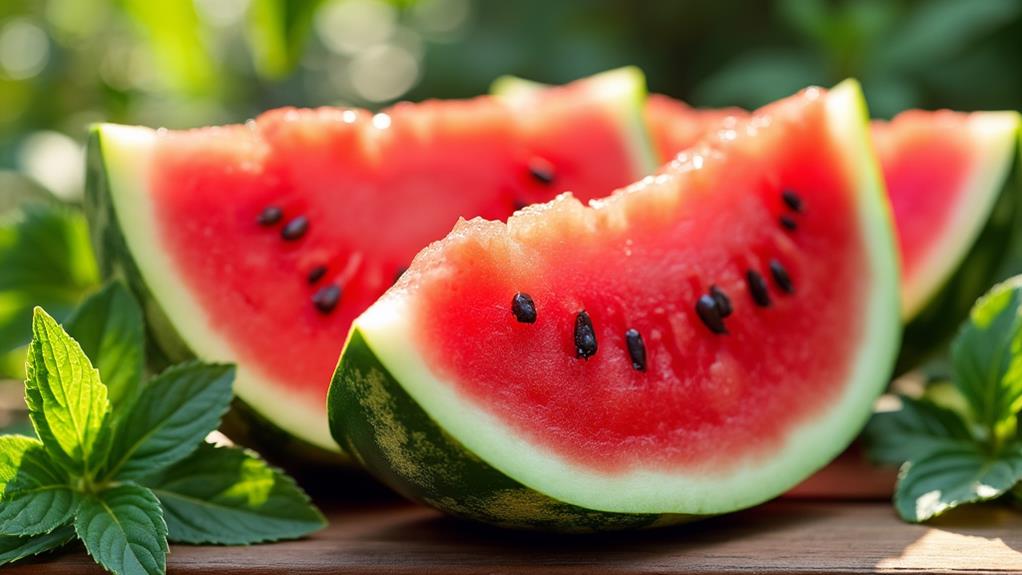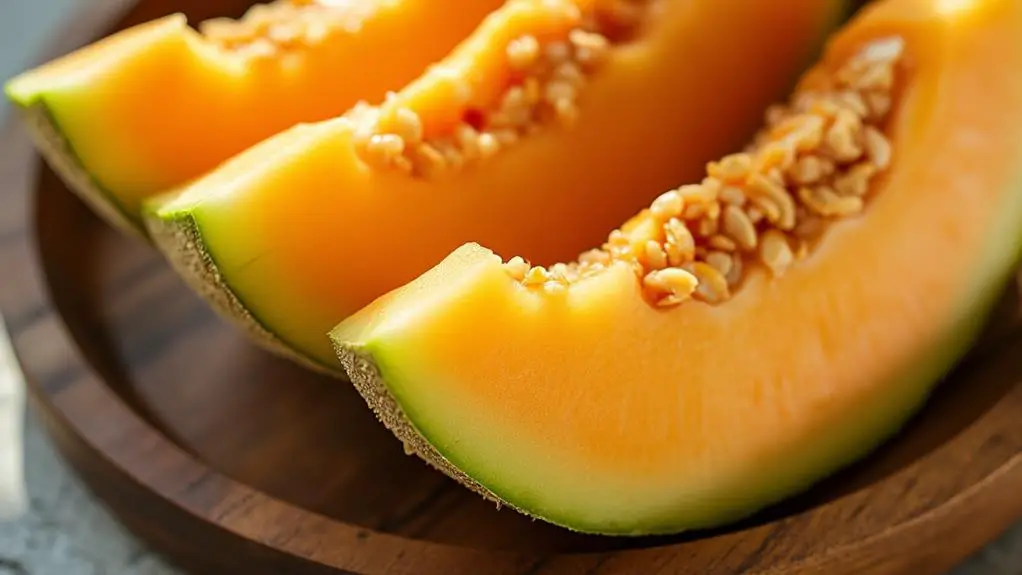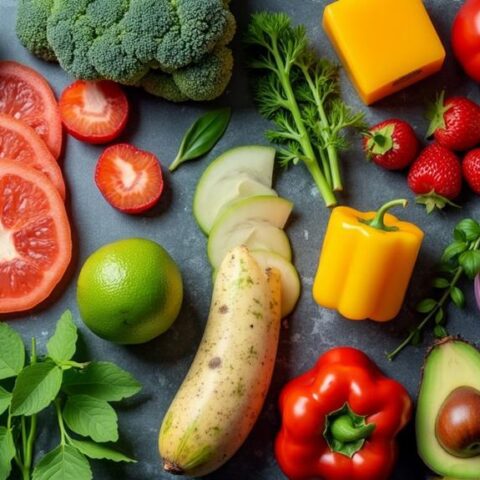
For those following a keto diet, choosing fruits that limit carbohydrate intake while offering nutrition is essential. Keto-friendly fruits include avocados, with under 1.5 grams of net carbs and high in healthy fats. Tomatoes serve as versatile additions with only 5 grams of net carbs per cup. Lemons, strawberries, and blackberries offer low net carbs and high antioxidants. Raspberries also provide similar benefits with less than 7 net carbs per cup. Watermelon, star fruit, cantaloupe, and peaches bring moderation into focus, with each offering their unique nutritive profile. Each fruit complements low-carb meals, supporting dietary adherence effectively. Discover more options for keto-friendly choices.
Key Takeaways
- Avocados are keto-friendly with less than 1.5 grams of net carbs per 100 grams.
- Tomatoes contain approximately 5 grams of net carbs per cup, making them suitable for keto diets.
- Strawberries offer about 8.7 grams of net carbs per cup and are rich in antioxidants.
- Blackberries provide around 6.2 grams of net carbs per cup, supporting immune health.
- Lemons have only 4 grams of net carbs per fruit and are high in vitamin C.
Avocados
Avocados, a unique fruit known for their rich content of healthy monounsaturated fats, are an exemplary choice for individuals adhering to a ketogenic diet. Botanically classified as a fruit, avocados are renowned not only for their nutritional profile but also for their versatility in culinary applications.
With less than 1.5 grams of net carbs per 100 grams, they fit seamlessly into low-carb meal plans. The diverse avocado varieties, such as Hass and Fuerte, offer subtle differences in flavor and texture, allowing for a broad range of avocado recipes that cater to varied palates.
Avocados are not only low in carbs but are also high in potassium and fiber, making them ideal for maintaining nutrient balance. Nutritionally, avocados are a powerhouse, offering substantial amounts of essential nutrients, including vitamin K, folate, vitamin C, and potassium. These nutrients are essential for overall health and complement the benefits of a ketogenic diet.
In addition, the high fiber content in avocados, nearly 7 grams per 100-gram serving, enhances satiety, aiding in effective weight management. Additionally, the antioxidants lutein and zeaxanthin present in avocados contribute to eye health by potentially reducing oxidative stress.
As a result, incorporating avocados into daily meals can provide both nutritional advantages and culinary diversity, making them an indispensable component of a well-rounded keto diet.
Tomatoes
Tomatoes, classified botanically as a fruit, offer a keto-friendly option with approximately 5 grams of net carbohydrates per 1-cup serving.
Unlike starchy vegetables like potatoes and corn, tomatoes have a lower carbohydrate content, making them suitable for ketosis.
Rich in antioxidants like lycopene, they contribute to reduced chronic disease risk and improved heart health.
Tomatoes also provide essential nutrients such as vitamin C, potassium, and vitamin K.
Their culinary versatility allows for integration into an array of dishes, making them an ideal choice for individuals maintaining a ketogenic diet.
Nutritional Benefits Overview
In the domain of keto-friendly fruits, one finds a remarkable option in the form of tomatoes, which are botanically classified as fruits. With a low carbohydrate content of approximately 3.3 grams of net carbs per one-cup serving, tomatoes are an ideal choice for those adhering to a ketogenic diet.
The diverse tomato varieties—ranging from cherry to heirloom—offer flexibility in culinary applications. Different cooking methods, such as roasting or incorporating into salads, provide not only flavor enhancement but also nutritional benefits without exceeding keto carb limits.
Tomatoes are low in calories, with around 30 calories per cup, thereby supporting calorie management in ketogenic regimens. They are a rich source of antioxidants, particularly lycopene and beta carotene, which play an essential role in reducing oxidative stress and potentially lowering the risk of chronic diseases.
In addition, tomatoes are packed with important vitamins and minerals, specifically vitamin C, potassium, and folate. These nutrients are significant for maintaining overall health and bolstering immune function.
The inclusion of tomatoes in a keto diet, consequently, offers a strategic advantage in achieving nutritional goals, enhancing both dietary diversity and health benefits without compromising the core principles of low-carb intake.
Suitable Serving Sizes
How should one approach serving sizes to maximize the benefits of tomatoes on a ketogenic diet? Managing serving sizes is vital in harnessing the nutritional advantages of tomatoes while adhering to the carbohydrate restrictions of the keto diet. A medium-sized tomato contains approximately 3.3 grams of net carbohydrates per cup, making it an excellent low-carb option. However, portion control is essential to guarantee that tomato consumption does not inadvertently increase carbohydrate intake beyond keto guidelines.
To assist in maintaining proper serving sizes, consider the following table:
| Serving Size | Net Carbs (g) | Calories |
|---|---|---|
| 1 Medium Tomato | 3.3 | 30 |
| 1/2 Medium Tomato | 1.65 | 15 |
| 1 Cup, Diced | 3.3 | 32 |
| 1/2 Cup, Diced | 1.65 | 16 |
| 1 Plum Tomato | 1.4 | 11 |
This table highlights typical serving sizes, helping to guide portion control effectively. By incorporating a medium-sized tomato into meals like salads or sauces, individuals can enjoy enhanced flavors without compromising ketosis. Tomatoes, rich in antioxidants such as lycopene and beta carotene, offer health benefits that extend beyond their low carbohydrate content. Monitoring portion sizes guarantees that these benefits can be reaped without disrupting the delicate balance of a ketogenic diet.
Culinary Versatility
Renowned for their culinary adaptability, tomatoes seamlessly integrate into a variety of dishes, making them a staple in the ketogenic diet. Botanically classified as a fruit, tomatoes offer a low-carb profile, with a medium tomato containing approximately 4.78 grams of carbohydrates. This nutritional advantage makes them an ideal component for keto-friendly meals.
Additionally, tomatoes are rich in antioxidants, particularly lycopene, which supports heart health and reduces inflammation, enhancing their value in dietary plans focused on long-term health benefits.
Tomato varieties such as Roma, cherry, and heirloom offer diverse culinary applications, each bringing unique flavors and textures to the table. Here are four ways to incorporate tomatoes into your keto regimen:
- Salads: Use raw cherry tomatoes to add sweetness and texture to green salads.
- Sauces: Blend Roma tomatoes into a savory base for low-carb pasta alternatives.
- Salsas: Combine diced tomatoes with herbs and spices for a rejuvenating, flavorful salsa.
- Stews and Casseroles: Cooked tomatoes enhance the depth of flavor in heartier dishes.
Incorporating tomatoes into meals not only enhances flavor but also provides essential vitamins and minerals such as vitamin C and potassium, vital for maintaining overall health.
Lemons

Lemon's versatility and health benefits make it an excellent choice for those adhering to a ketogenic diet. With approximately 4 grams of net carbohydrates per fruit, lemons fit well within the dietary restrictions of keto. They are rich in vitamin C, providing 51% of the daily value, which bolsters immune function and supports skin health.
The low-calorie profile, with only about 17 calories per lemon, allows for flavor enhancement without considerably impacting daily caloric intake. Furthermore, lemons provide beneficial compounds like citric acid, which can aid in the prevention of kidney stones, a concern for some on high-fat diets. Additionally, they contain antioxidants that help mitigate oxidative stress, supporting overall health.
Lemon zest and lemon juice are particularly beneficial in a ketogenic regimen. Lemon zest can be used to add a revitalizing flavor to both sweet and savory dishes without introducing additional carbs.
Lemon juice serves as a versatile ingredient to flavor water or culinary creations, promoting hydration and healthier eating habits, critical components of a successful keto lifestyle.
In addition, lemons contain beneficial compounds such as citric acid and antioxidants. Citric acid is known to aid in the prevention of kidney stones, a potential concern for some individuals on a high-fat diet.
Antioxidants present in lemons help mitigate oxidative stress, further supporting overall health. Therefore, lemons offer a multifaceted approach to enhancing both flavor and nutrition in a keto diet.
Strawberries
Strawberries offer significant nutritional benefits for those following a keto diet, providing approximately 8.7 grams of net carbohydrates per 1-cup serving, which is reasonably low for maintaining ketosis.
Rich in antioxidants such as anthocyanins, these berries may contribute to improved vascular function and cholesterol management.
Moreover, their high vitamin C content and low glycemic index make strawberries an excellent choice for supporting immune health and stable blood sugar levels.
Additionally, incorporating strawberries into your diet can complement a personalized approach to managing cholesterol levels, given the varied individual responses to dietary changes.
Nutritional Benefits
Among the array of keto-friendly fruits, strawberries stand out for their exceptional nutritional profile. Rich in essential nutrients, strawberries provide a myriad of health benefits that align well with a ketogenic lifestyle. The fiber content in strawberries is notable, with each cup delivering approximately 3 grams. This fiber aids digestion and contributes to satiety, making it easier to adhere to dietary goals.
Additionally, strawberries are an excellent source of vitamin C, providing around 149% of the daily recommended value per cup. This vitamin plays an essential role in immune support, bolstering the body's defenses against illnesses.
Key nutritional highlights of strawberries include:
- Antioxidant Properties: Rich in anthocyanins, strawberries help reduce inflammation and lower the risk of chronic diseases.
- Heart Health: Regular consumption can improve heart health by increasing HDL (good) cholesterol levels and reducing LDL (bad) cholesterol levels.
- Low-Calorie Option: At approximately 49 calories per cup, strawberries are a low-calorie fruit that can support weight loss goals.
- Net Carbs: With about 8.7 grams of net carbs per cup, strawberries are a suitable choice for maintaining ketosis.
Incorporating strawberries into a ketogenic diet can offer substantial health benefits while supporting dietary restrictions.
Carb Content Analysis
When analyzing the carbohydrate content of strawberries, it becomes evident that their composition is particularly suited to a ketogenic diet. A one-cup serving of strawberries contains approximately 11.7 grams of carbohydrates, which includes 3 grams of dietary fiber. This results in a net carbohydrate content of 8.7 grams, making strawberries a viable option for those adhering to a strict carbohydrate intake while seeking keto fruit alternatives.
In a carb comparison with other fruits, strawberries demonstrate a relatively low net carb count, positioning them favorably within the context of a keto diet.
The key to incorporating strawberries into a ketogenic lifestyle lies in mindful portion control. Given that the net carb content is 8.7 grams per one-cup serving, it remains essential to moderate intake to avoid surpassing daily carbohydrate limits, thereby preserving the state of ketosis.
Additionally, their low caloric content, at approximately 49 calories per serving, further enhances their appeal as a healthy, keto-friendly fruit.
Strawberries also offer substantial nutritional benefits beyond their carbohydrate profile, contributing to a well-rounded dietary approach. However, it is essential to adhere to appropriate serving sizes to optimize their inclusion in a ketogenic regimen.
Antioxidant Properties
Renowned for their antioxidant properties, strawberries offer a rich composition of bioactive compounds that contribute considerably to health benefits. The primary antioxidants present in strawberries include anthocyanins, which not only give the fruit its vibrant red hue but also help mitigate oxidative stress within the body. This antioxidant synergy is essential for maintaining ideal health, particularly in reducing the risk of chronic diseases.
- Anthocyanins: These powerful antioxidants are instrumental in combating oxidative stress, thereby potentially reducing inflammation and promoting cardiovascular health.
- Vitamin C: A 1-cup serving of strawberries provides approximately 97 milligrams of this essential vitamin, vital for immune function and skin health, further enhancing the fruit's health benefits.
- Quercetin: This flavonoid antioxidant possesses anti-inflammatory properties that may aid in lowering blood pressure, contributing to cardiovascular health and general well-being.
- Ellagic Acid: Found in strawberries, this compound exhibits anti-cancer properties by inhibiting tumor growth, thereby offering protective health benefits.
Moreover, the high fiber content in strawberries, about 3 grams per cup, supports gut health and bolsters the body's overall antioxidant defense system, enhancing the fruit's thorough health benefits.
To summarize, strawberries are an exemplary keto-friendly fruit, rich in antioxidants that synergize to promote holistic well-being.
Blackberries

Blackberries' nutritional profile makes them an excellent addition to a ketogenic diet. With approximately 13.8 grams of carbohydrates per cup and a substantial fiber content of about 7.6 grams, the net carbohydrate count is reduced to around 6.2 grams. This low net carb value allows for the incorporation of blackberries into a variety of keto-friendly recipes, including smoothies, salads, and desserts, without compromising dietary guidelines.
The versatility of blackberry recipes guarantees that this fruit can be both a flavorful and healthful component of meals. Additionally, incorporating blackberries can help maintain steady blood sugar levels due to their low glycemic index, which is essential for those managing diabetes on a ketogenic diet.
In terms of blackberry health benefits, these berries are rich in antioxidants and are particularly high in vitamin C, vitamin K, and manganese. These nutrients are critical for supporting overall health and bolstering immune function.
Moreover, with only about 43 calories per 100-gram serving, blackberries present a low-calorie option, ideal for those who are mindful of caloric intake while on a ketogenic diet. The significant fiber content not only aids in promoting digestive health but also in maintaining satiety, making blackberries a wise choice for snacks or meal components.
This combination of nutritional benefits underscores the suitability of blackberries for anyone following a keto lifestyle.
Raspberries
Raspberries offer a robust nutritional profile suitable for the keto diet, containing approximately 7 grams of net carbs and 8 grams of dietary fiber per cup, which supports digestion and satiety.
For those following a ketogenic lifestyle, raspberries can be a delightful addition due to their low carbohydrate content, similar to keto-friendly sweeteners like stevia and erythritol.
Rich in antioxidants such as quercetin and ellagic acid, raspberries may reduce inflammation and oxidative stress, while their high vitamin C content bolsters immune function and skin health.
Easily integrated into keto-friendly dishes, raspberries enhance meals like smoothies, salads, and yogurt with minimal impact on carbohydrate intake.
Nutritional Benefits of Raspberries
A vibrant addition to any diet, raspberries offer an array of nutritional benefits that align well with the principles of a ketogenic lifestyle.
These small fruits are not only low in carbohydrates, with approximately 7 grams of net carbs per 1-cup serving, but also packed with nutrients that provide substantial health benefits.
In particular, their high dietary fiber content—around 8 grams per cup—facilitates digestion and promotes feelings of fullness, making them an excellent component of various raspberry recipes.
Raspberries also boast a rich profile of antioxidants such as vitamin C and quercetin.
These compounds are vital for combating oxidative stress and reducing inflammation, contributing to overall health and wellness.
Additionally, the low glycemic index of raspberries aids in blood sugar control and improves insulin sensitivity, essential for those managing carbohydrate intake on a keto regimen.
Here are four key nutritional benefits of raspberries:
- Low-carb content: Ideal for keto diets, minimizing carbohydrate intake.
- High dietary fiber: Promotes digestive health and satiety.
- Abundant antioxidants: Supports cellular health and reduces inflammation.
- Low glycemic index: Helps regulate blood sugar levels effectively.
Incorporating these berries into your diet can enhance your nutritional intake without compromising ketogenic goals.
Incorporating Raspberries in Keto
Integrating raspberries into a ketogenic diet can be a strategic choice for those seeking a low-carb, nutrient-dense fruit option. With approximately 2.6 grams of net carbs per 100 grams, raspberries serve as an excellent fruit choice for keto enthusiasts. Their high dietary fiber content, about 8 grams per cup, aids in digestion and enhances satiety, supporting weight management goals.
| Preparation Method | Description |
|---|---|
| Raspberry Smoothies | Blend raspberries with almond milk for a rejuvenating low-carb beverage. |
| Raspberry Salads | Add raspberries to spinach and feta for a tangy twist. |
| Raspberry Snacks | Enjoy fresh raspberries alone or with a handful of nuts. |
| Raspberry Desserts | Use raspberries to top keto-friendly desserts like cheesecake. |
| Raspberry Breakfast | Mix with Greek yogurt for a nutritious start. |
Additionally, raspberries are rich in antioxidants, including vitamin C and quercetin, which combat oxidative stress and inflammation. This makes them not only a keto-friendly option but also a functional food that contributes to overall health. Whether incorporated into raspberry smoothies, raspberry salads, or enjoyed as raspberry snacks and raspberry desserts, this fruit provides a versatile way to satisfy sweet cravings without derailing your ketogenic goals. At only 64 calories per cup, raspberries offer a nutrient-dense addition to any keto meal plan.
Watermelon

Among the array of fruits available to those following a ketogenic diet, watermelon stands out as a hydrating, low-calorie option that can be enjoyed in moderation.
Watermelon contains approximately 11 grams of net carbohydrates per 1-cup serving, making it a viable option for those mindful of their carb intake. With its composition of about 92% water, watermelon aids in maintaining hydration while providing minimal caloric intake, an essential factor for keto dieters.
It's important to remember that regular monitoring of blood sugar and ketones is vital during the keto diet to avoid hypoglycemia.
Watermelon varieties such as Sugar Baby and Crimson Sweet offer diverse flavor profiles, enhancing the culinary possibilities for keto-friendly watermelon recipes. These recipes range from simple salads to invigorating smoothies, allowing keto followers to enjoy watermelon's natural sweetness without compromising their dietary objectives.
The nutritional benefits of watermelon extend beyond hydration and low caloric content:
- Antioxidant-Rich: High levels of lycopene, an antioxidant linked to reduced cell damage.
- Nutrient-Dense: Supplies essential vitamins and minerals, including vitamin C, potassium, and copper.
- Cancer Protection: Lycopene's protective effects may reduce the risk of certain cancers.
- Satisfies Sweet Cravings: Naturally sweet, offering a healthier alternative to sugary snacks.
Incorporating watermelon into a ketogenic diet can therefore provide both health benefits and flavorful satisfaction.
Star Fruit
Watermelon is not the only fruit capable of aligning with ketogenic dietary goals; star fruit, or carambola, also fits well due to its low carbohydrate profile. With approximately 7.3 grams of carbohydrates and 3 grams of fiber per 1-cup serving, star fruit offers around 4.3 grams of net carbs, making it a suitable choice for those adhering to the keto lifestyle.
This tropical fruit provides significant nutritional benefits, primarily due to its high vitamin C content—about 52 mg per serving—which plays an essential role in supporting immune function and promoting skin health. Additionally, leafy greens and other low-carb fruits like star fruit contribute to a well-rounded keto diet.
Furthermore, star fruit is rich in antioxidants such as quercetin and gallic acid. These compounds are instrumental in reducing inflammation and safeguarding cells against oxidative stress, thereby enhancing overall health outcomes. The fruit's distinctive star shape when sliced adds a visual appeal, making it an excellent component in salads and garnishes.
Incorporating star fruit into your diet is straightforward with various star fruit recipes available, ranging from invigorating salads to exotic desserts. Its hydrating properties and low carb content render it a revitalizing choice for ketogenic individuals seeking both nutrition and culinary variety.
Cantaloupe

Cantaloupe, with its naturally sweet flavor and hydrating properties, is a remarkable addition to a ketogenic diet despite its slightly higher carbohydrate content compared to other keto-friendly fruits. One cup of cantaloupe contains approximately 11.2 grams of net carbs, positioning it as a low-carb fruit that can be consumed in moderation.
Its rich composition of vitamins A and C contributes considerable antioxidant benefits, enhancing immune function and promoting skin health. Moreover, cantaloupe's high water content, around 90%, aids in maintaining hydration levels, essential for those adhering to low-carb dietary plans.
Additionally, cantaloupe is a great choice for seniors on a keto diet as it provides essential minerals like potassium, which is crucial for muscle function and blood pressure regulation.
Cantaloupe varieties, such as the well-known Hale's Best and Ambrosia, provide diverse flavor profiles, ensuring versatility in culinary applications. This fruit can be incorporated into various cantaloupe recipes, from invigorating salads to keto-friendly smoothies, without greatly impacting daily carbohydrate limits.
Here are four key benefits of incorporating cantaloupe into your keto diet:
- Low net carbs: Suitable for keto in moderation.
- Rich in antioxidants: Supports immune and skin health.
- Hydrating properties: Aids fluid balance.
- Essential minerals: Supports muscle and blood pressure health.
Peaches
Peaches, though slightly higher in carbohydrates than some other keto-friendly options, can be incorporated into a ketogenic diet when consumed with careful portion control. With approximately 14.7 grams of carbohydrates and 2.5 grams of fiber per cup, peaches offer around 12.2 grams of net carbs. This nutritional profile necessitates attention to serving sizes for those adhering to strict carbohydrate limits. Nevertheless, the inclusion of peaches in keto diets can be beneficial due to their rich supply of vitamins A and C, essential for immune support and skin health.
The table below highlights key nutritional aspects of peaches:
| Nutrient | Amount per Cup | Benefits |
|---|---|---|
| Carbohydrates | 14.7g | Energy source |
| Fiber | 2.5g | Digestive health |
| Potassium | 285mg | Heart health, blood pressure regulation |
Peach varieties such as freestone or clingstone can be used to create keto-compliant peach recipes, offering dietary diversity. Their potassium content further supports cardiovascular function, aligning with the ketogenic diet's focus on overall well-being. To avoid surpassing daily carbohydrate targets, it is essential for individuals to measure portions accurately. To conclude, while peaches require moderation, their nutritional benefits make them a valuable addition to a well-balanced ketogenic diet.
Frequently Asked Questions
What Is the Most Keto-Friendly Fruit?
The most keto-friendly fruit is the avocado, renowned for its keto fruit benefits. It offers low carb options, containing only approximately 2.8 grams of net carbs per 100 grams, while providing healthy fats and dietary fiber.
Can You Go Into Ketosis if You Eat Fruit?
Yes, entering ketosis while consuming fruit is feasible if the fruit's carb content is closely monitored. Selecting low-carb fruits and maintaining strict portion control can minimize ketosis impact, allowing for adherence to carbohydrate restrictions.
What Fruit Is Good for Keto Breakfast?
For a keto breakfast, fruits like avocados, raspberries, and strawberries are ideal. They can enhance keto smoothie recipes or serve as low carb toppings, providing essential nutrients while maintaining dietary ketosis due to their minimal net carb content.
How Many Fruits a Day on Keto?
On a keto diet, fruit portion control is essential to maintain ketosis. Typically, 1-2 servings of low-carb fruits per day guarantees a keto diet balance, allowing individuals to enjoy fruits without exceeding carbohydrate limits.
Conclusion
To sum up, the incorporation of keto-friendly fruits such as avocados, tomatoes, lemons, strawberries, blackberries, watermelon, star fruit, cantaloupe, and peaches can greatly enhance the nutritional profile of a ketogenic diet. These fruits provide essential vitamins, minerals, and antioxidants while maintaining low carbohydrate content, aligning with the dietary requirements of ketosis. Their inclusion supports metabolic health, aids in maintaining electrolyte balance, and contributes to overall dietary variety. Consequently, these fruits are suitable for individuals adhering to a ketogenic lifestyle.










No Comments